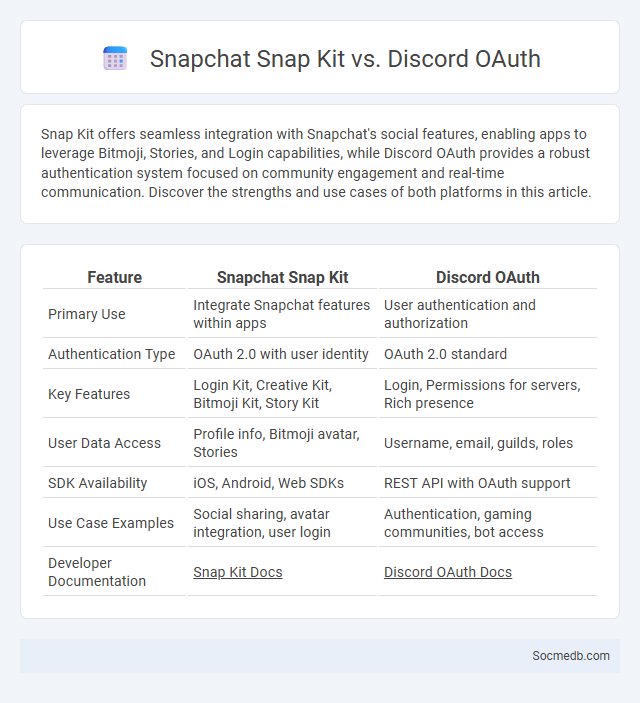
Photo illustration: Snapchat Snap Kit vs Discord OAuth
Snap Kit offers seamless integration with Snapchat's social features, enabling apps to leverage Bitmoji, Stories, and Login capabilities, while Discord OAuth provides a robust authentication system focused on community engagement and real-time communication. Discover the strengths and use cases of both platforms in this article.
Table of Comparison
| Feature | Snapchat Snap Kit | Discord OAuth |
|---|---|---|
| Primary Use | Integrate Snapchat features within apps | User authentication and authorization |
| Authentication Type | OAuth 2.0 with user identity | OAuth 2.0 standard |
| Key Features | Login Kit, Creative Kit, Bitmoji Kit, Story Kit | Login, Permissions for servers, Rich presence |
| User Data Access | Profile info, Bitmoji avatar, Stories | Username, email, guilds, roles |
| SDK Availability | iOS, Android, Web SDKs | REST API with OAuth support |
| Use Case Examples | Social sharing, avatar integration, user login | Authentication, gaming communities, bot access |
| Developer Documentation | Snap Kit Docs | Discord OAuth Docs |
Introduction to Social App Authentication Solutions
Social app authentication solutions streamline user access by integrating secure login methods such as OAuth, Single Sign-On (SSO), and biometric verification. These technologies enhance user experience while protecting personal data across platforms like Facebook, Google, and Twitter. Ensuring your app incorporates robust authentication safeguards your user's privacy and boosts trust in your social media application.
Overview of Snapchat Snap Kit
Snap Kit is a developer platform by Snapchat that allows third-party apps to integrate Snapchat's features such as Bitmoji, Story sharing, and Login authentication. It enables seamless social media experiences by leveraging Snapchat's user base and core functionalities, enhancing user engagement and retention. Key components include Creative Kit for content sharing, Login Kit for user authentication, and Bitmoji Kit for personalized avatars.
Overview of Discord OAuth
Discord OAuth enables secure user authentication by allowing third-party applications to access user data without exposing passwords. It uses the OAuth 2.0 authorization framework to grant limited access tokens, facilitating seamless integration with Discord's platform features such as user identity, guild membership, and messaging. Developers leverage Discord OAuth to streamline login processes, enhance security, and personalize user experiences across gaming and community applications.
Comparing Authentication Processes
Social media platforms employ varied authentication processes, from simple email and password verification to advanced multi-factor authentication (MFA) methods like biometric recognition and one-time passcodes. Platforms such as Facebook and Instagram increasingly implement MFA to enhance account security and prevent unauthorized access, while Twitter offers login verification through both SMS codes and authentication apps for diverse user preferences. Comparing these processes highlights the balance between user convenience and robust security measures critical in protecting personal data across social networks.
User Privacy and Data Security
User privacy and data security are critical challenges in social media platforms due to the vast amounts of personal information shared online. Robust encryption protocols, multi-factor authentication, and strict data access controls are essential to safeguard user data from unauthorized access and breaches. Implementing transparent data policies and giving users control over their personal information helps build trust and comply with regulations like GDPR and CCPA.
Integration Complexity and Developer Experience
Social media platforms present significant integration complexity due to diverse APIs, frequent updates, and varying authentication methods, challenging developers to maintain seamless connectivity. Your development experience improves with robust SDKs, comprehensive documentation, and supportive communities that simplify implementation and troubleshooting. Streamlined integration workflows reduce deployment time and enhance the scalability of social media functionalities across multiple channels.
Cross-Platform Compatibility
Cross-platform compatibility ensures your social media content is accessible and visually consistent across various devices and operating systems, such as iOS, Android, Windows, and macOS. Optimizing videos, images, and interactive elements for different screen sizes and browser capabilities enhances user engagement and reach. Ensuring seamless functionality and performance on popular platforms like Facebook, Instagram, Twitter, and LinkedIn maximizes your social media impact.
Customization and User Experience
Social media platforms offer extensive customization options, allowing users to tailor their feeds, notifications, and privacy settings to match personal preferences and interests. Enhanced user experience is achieved through intuitive interfaces, personalized content algorithms, and interactive features that increase engagement and satisfaction. By optimizing your social media experience, you can connect more meaningfully with relevant content and communities.
Use Cases and Industry Applications
Social media drives targeted marketing campaigns by enabling businesses to engage with specific customer segments and track real-time consumer behavior analytics. Industries such as retail, healthcare, and entertainment leverage social platforms for brand awareness, customer support, and influencer collaborations to boost sales and loyalty. Your enterprise can harness social media data to optimize product launches and enhance personalized user experiences across digital channels.
Conclusion: Choosing the Right Social Login Solution
Selecting the right social login solution enhances user experience by simplifying the authentication process and increasing sign-up rates. Security features, data privacy compliance, and integration capabilities with existing platforms are critical factors driving the decision. Implementing an optimized social login strategy supports higher user retention and streamlined access management across digital services.
 socmedb.com
socmedb.com